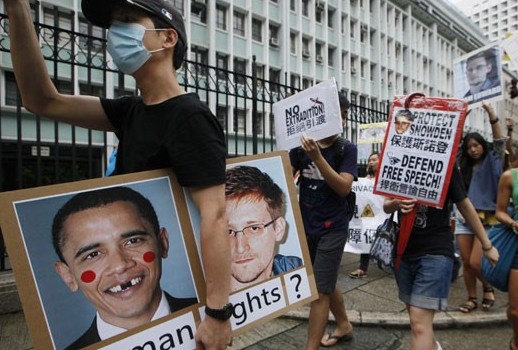
In the age of total informational awareness and connectivity, what rights do citizens have to privacy? [File photo]
Somewhere in a Moscow airport, hiding in an international transit zone, accused spy Edward Snowden is holding laptops full of information on U.S. domestic surveillance programs that gathered data on the telephone records of millions of Americans. Among other revelations, he said the U.S. government "had been hacking into computers in Hong Kong and [in China] for years," reported the South China Morning Post.
|
|
|
In the age of total informational awareness and connectivity, what rights do citizens have to privacy? [File photo] |
Snowden fled first to Hong Kong and is now asking for asylum in Ecuador. Russia has no extradition treat with the U.S. and has so far denied requests to turn over the whistleblower. The fugitive has captured the attention of the world media, and sparked debate about espionage and government transparency. Some are comparing Snowden to Daniel Ellsburg, the 1971 leaker of the Pentagon Papers, who exposed U.S. government propaganda on its involvement in Viet Nam. Others compare him to Bradley Manning, who was behind the WikiLeaks disclosure of classified diplomatic cables.
President Obama, loath to make Snowden a counterculture hero, dismissed him as "a 29-year-old hacker" and shrugged off negotiations for extradition.
"I'm not going to have one case of a suspect who we're trying to extradite suddenly being elevated to the point where I've got to start doing wheeling and dealing and trading on a whole host of other issues simply to get a guy extradited," the president told reporters in Senegal.
Beyond the game of cat and mouse, larger questions about technology have emerged. In the age of total informational awareness and connectivity, what rights do citizens have to privacy? Legislation quietly introduce to provide legal protection to phone service provider Verizon and Internet search engine Google against sharing cyber-attack information have stalled as the U.S. public learns those companies are already turning over personal data.
"People's demand for transparency has definitely increased," Jan Schakowsky, the top Democrat on the House Intelligence Oversight and Investigations subcommittee, told Bloomberg News.
The case is also embarrassing for the Obama administration in international diplomacy. The U.S. is revealed to be participating in the same cyber attacks of which it has often accused other countries. The administration has also failed to see the irony of charging Snowden with spying on the government's spy program.
Political satirist Adam Borowitz joked that a government spokesman "surprised observers by announcing the spying charges against Mr. Snowden with a totally straight face."
"These charges send a clear message," Borowitz writes. "In the United States, you can't spy on people."
With the sheer increase in the sensitive information gathered and digitized there are now more than 4.9 million people with security clearance -- that includes roughly 483,000 contractors with top-secret clearance, like Snowden, said ThinkProgress. The risks of leaks have increased proportionally, and the Obama has already pursued eight cases for espionage.
Perhaps, as WikiLeaks founder Julian Assange said, Snowden is just a member of the "young, technically minded" generation that is making a stand for individual freedom against the security-driven mass surveillance of a U.S. National Security Agency armed with the technology to gather and analyze the digital trails of our lives, said Roger Cohen for the New York Times. Government data hauling on its own citizens seems downright un-American – a country founded on the notions of individual rights. Nor does it seem right that the United States should turn over its surveillance monitoring to corporations like Snowden's employer Booz Allen. The "blank check" written to intelligence agencies post 9/11 has been spent destroying civil liberties in secret. Snowden called it "turnkey tyranny."
For now, Snowden is apparently holed up in an international no-man's land and Hong Kong has declared it will not let him return. His U.S. passport is cancelled. Ecuador acknowledged it has received Snowden's request for asylum but it seems more and more unlikely it will offer him refuge.
"The situation of Mr. Snowden is a complex situation and we don't know how he will solve it," President Rafael Correa said at a press conference.
Cuba and Venezuela have also reportedly offered to consider Snowden's request for asylum though the Obama administration continues to insist there is "clear legal basis" for Russia to hand over the fugitive. He has not yet been seen on any flights out of the Moscow airport. He is also not registered at the airport hotel, and has not been spotted by the gathering journalists camped out in the transit zone. He has vanished, but the implications of his revelations continue to grow.
The author is a contributing writer to Beijing Review, living in New York City